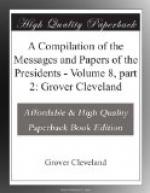March 13, 1865, received the rank of brevet major-general
“for gallant and distinguished services during
the campaign of 1864 in West Virginia, and particularly
at the battles of Fishers Hill and Cedar Creek, Virginia.”
In August, 1864, while in the field, was nominated
for Congress and elected. After the war, returned
to civil life, and took his seat in Congress December
4, 1865. Voted with his party on questions connected
with the reconstruction of the Southern States; supported
a resolution declaring the sacredness of the public
debt and denouncing repudiation, and also one commending
President Johnson for declining to accept presents
and condemning the practice; opposed a resolution
favoring an increase of pay of members of Congress;
introduced in a Republican caucus resolutions declaring
that the only mode of obtaining from the States lately
in rebellion irreversible guaranties was by constitutional
amendment, and that an amendment basing representation
upon voters instead of population ought to be acted
upon without delay. In August, 1866, was renominated
for Congress by acclamation, and was reelected.
Supported the impeachment of President Johnson.
In June, 1867, was nominated for governor of Ohio,
and at the election defeated Judge Allen G. Thurman.
In June, 1869, was again nominated for governor, and
at the election defeated George H. Pendleton.
At the expiration of his term as governor declined
to be a candidate for the United States Senate against
John Sherman. In 1872 was again nominated for
Congress, but at the election was defeated. Declined
the office of assistant treasurer of the United States
at Cincinnati. In 1873 established his home at
Fremont with the intention of retiring from public
life. In 1875 was again nominated for governor
of Ohio, and at the election defeated William Allen.
Was nominated for President of the United States at
the national Republican convention at Cincinnati on
June 16, 1876. The Democrats selected as their
candidate Samuel J. Tilden, of New York. The
result of the election became the subject of acrimonious
dispute. Each party charged fraud upon the other,
and both parties claimed to have carried the States
of Louisiana, South Carolina, and Florida. To
avoid a deadlock, which might have happened if the
canvass of the electoral votes had been left to the
two Houses of Congress (the Senate having a Republican
and the House of Representatives a Democratic majority),
an act, advocated by members of both parties, was
passed to refer all contested cases to a commission
composed of five Senators, five Representatives, and
five Justices of the Supreme Court, the decision of
this commission to be final unless set aside by a
concurrent vote of the two Houses of Congress.
The commission, refusing to go behind the certificates
of the governors, decided in each contested case by
a vote of 8 to 7 in favor of the Republican electors,
beginning with Florida on February 7, and on March
2 Mr. Hayes was declared duly elected President of




